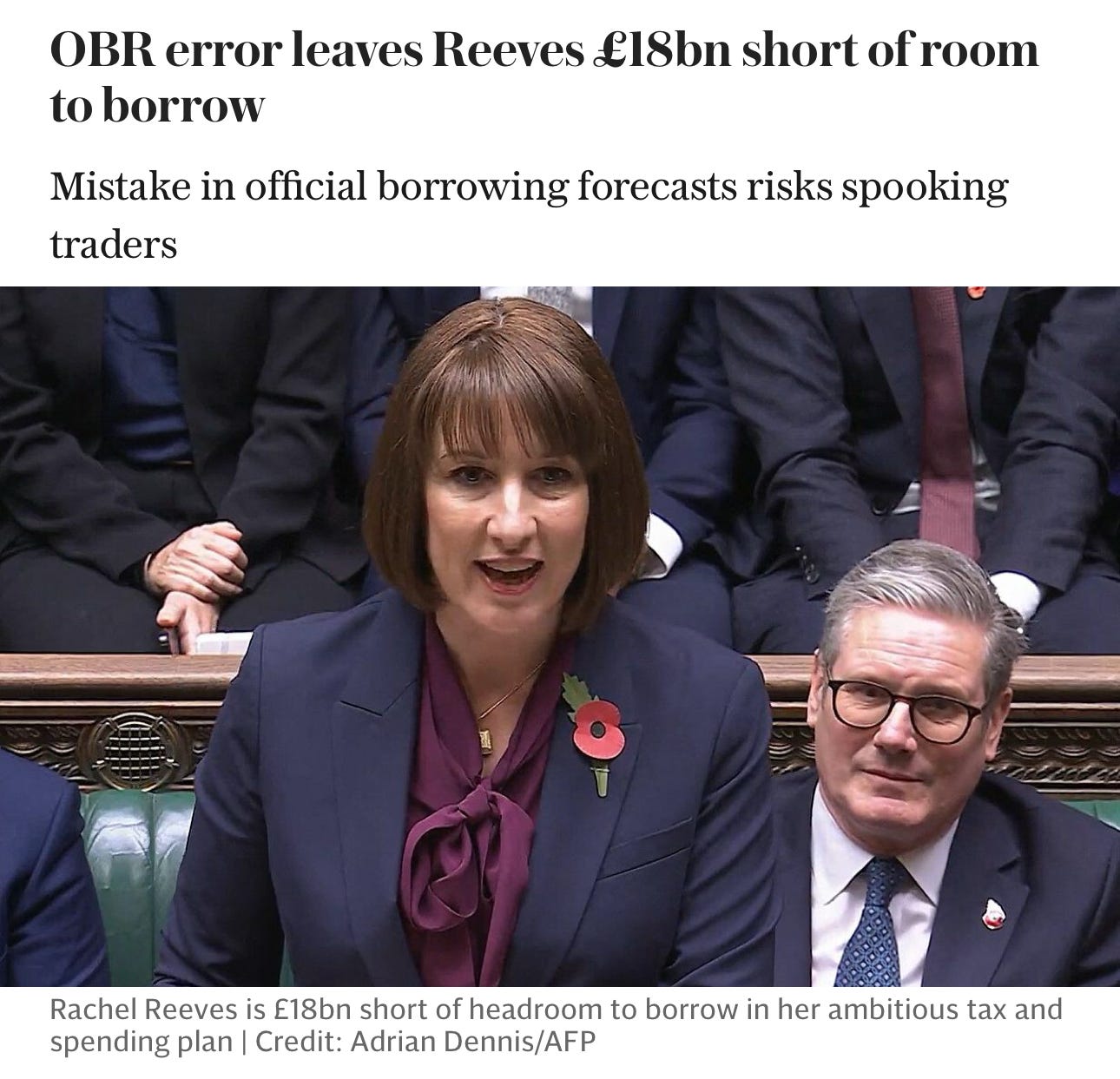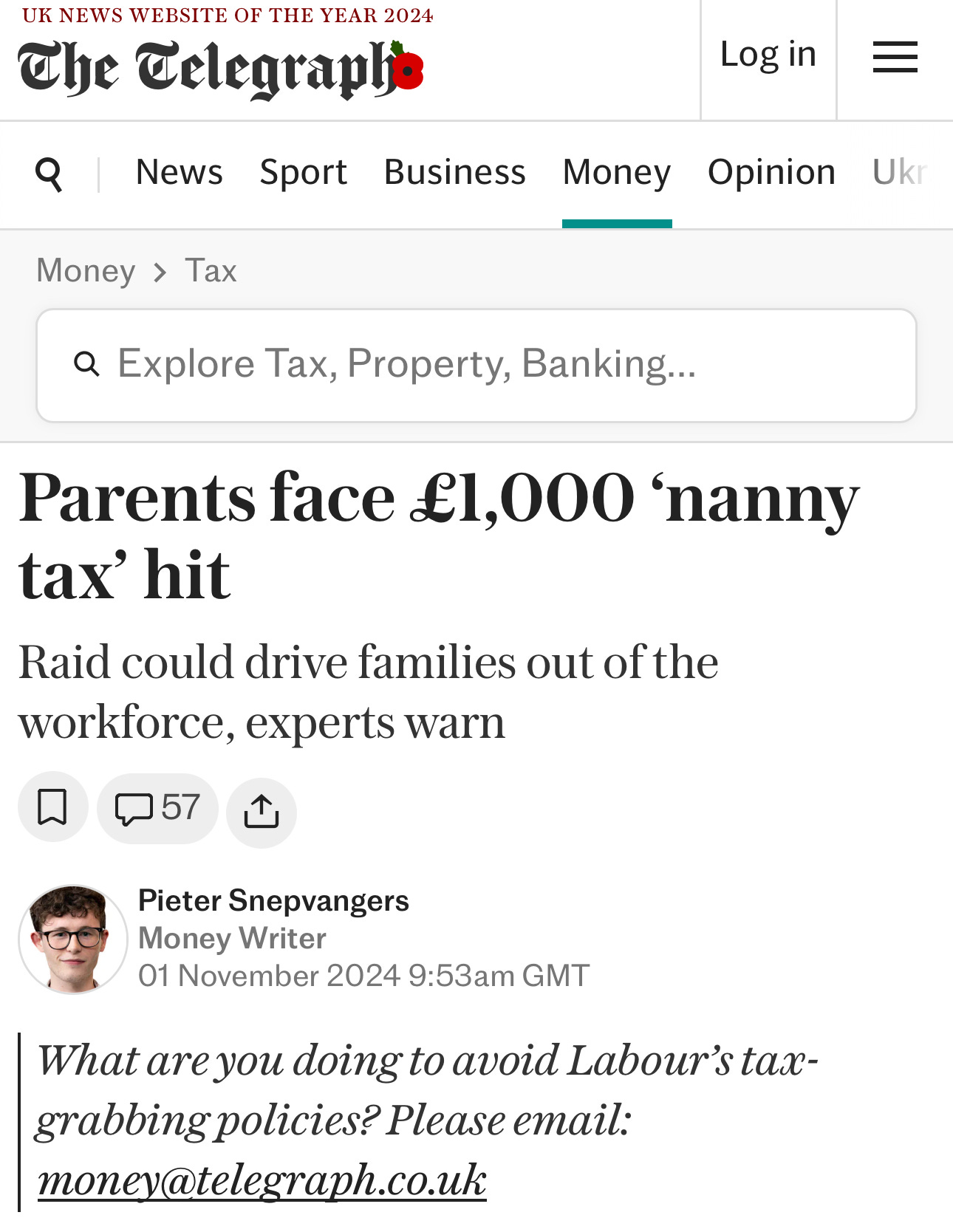Why The Telegraph Wants You Angry (and What They’re Not Telling You)
Dissecting The Telegraph’s misleading headlines on Labour’s tax plans and nanny “tax raids” to reveal the agenda-driven journalism at play
Let’s do an exercise today (no, it's not a physical exercise, keep yourself comfortable wherever you are).
I’d like you to read the below screenshot of a headline from The Telegraph, then pause before continuing with this post and consider your response.
So, what did you feel when you read that? Anxious? Worried? Annoyed at the OBR? Perhaps you thought Labour’s budgetary plans were suddenly teetering on the edge?
Now, let’s look at another example.
How did this one make you feel? Angry at Labour for going after parents? Worried about the impact on families and the workforce? You're starting to really, really dislike Rachel Reeves, aren't you?
In both of the cases, do you feel more informed? Or do you feel more pissed off?
And that's the exercise done - so let's discuss this in a bit more detail.
The reality behind both of these headlines is, of course, far less exciting than the hysteria they’re designed to evoke. In the case of the £18bn "shortfall," it’s not a dramatic loss but merely a recalibration related to a shift in accounting metrics. As for the "nanny tax," the Telegraph conveniently leaves out some very important context that would make you realise that no, childcare for most people is not at risk.
We all know that The Telegraph has long held a conservative stance, and as the political landscape shifts, it’s become very clear that it’s feeling the pressure to mount a defensive front against Labour’s economic proposals. What better way to undermine Labour’s policies than by creating a bit of good old-fashioned panic?
Now, with that all in mind, let's go into some detail about exactly why The Telegraph is doing what it's doing, and why it's terrible journalism.
🔴 Creating Fear to Influence Perception
The £18bn "shortfall" headline is crafted to create an impression of chaos, as though Labour’s borrowing plans have been derailed by some critical error. The words "short of room to borrow" and "spooking traders" imply an impending financial collapse or a massive gap in Labour’s planning. In reality, this "shortfall" is just a recalibration tied to a new debt metric and the OBR made a minor correction, Labour still has £44bn of borrowing headroom, and there is no financial disaster.
The fact is, that fear is a powerful tool. It’s crucial for The Telegraph because fear makes readers tune in. Fear is sticky. It lingers. If they can get you to feel uneasy about Labour’s competence, you’re more likely to click again tomorrow to see what new disaster is supposedly unfolding.
Fear also keeps readers from rational thinking - it's not about the facts anymore, it’s about the anxiety. If The Telegraph can make you feel like Labour is teetering the country on the brink of economic collapse, they can keep you hooked, keep you outraged, and most importantly, keep you distrustful of the alternative to the status quo.
🔴 The Myth of "Middle-Class Persecution"
This is a favourite strategy of the Telegraph, and is pretty blatant in the piece about the "nanny tax." The headline would make you believe that Labour hellbent on making life completely miserable for "everyday parents." What is conveniently not stated in the headline is that to reach this £1,000 figure, a nanny would need to be earning £46,000 a year - an amount that only the wealthiest of households are paying for childcare, and working out at approximately £89 a month extra, is hardly the straw that's going to break the gilded camel's back. So, unless your nanny is getting a salary that rivals some doctors, you’re probably safe.
This particular strategy plays into the ever-popular notion that Labour is out to punish hard-working, aspirational families. The Telegraph knows this kind of subtle manipulation works wonders. After all, nothing riles up the middle class quite like the idea that someone wants to take their hard-earned money. It’s an emotional trigger - one that taps into fears of losing status or being squeezed unfairly by "those in power."
By presenting Labour’s policies in this way, The Telegraph aims to ensure its readers are angry, defensive, and ready to see Labour as the villain in their story. It’s less about the truth of the policy and more about stirring the pot, making sure the middle class feels under attack from any proposed changes.
🔴 The Paywall Smoke and Mirrors
And then we get to the paywalls. The Telegraph’s use of paywalls means that most readers see only the sensationalist headlines and maybe a few dramatic opening lines without ever accessing the context buried deeper in the article. Convenient, isn’t it? Just enough fear to provoke outrage, not enough detail to provide clarity.
This tactic is particularly insidious because it weaponises curiosity against the reader. The headline makes you want to know more, makes you anxious about what's really happening, but then blocks that knowledge unless you cough up some cash. It preys on the instinctive need for closure, leaving the reader half-informed and, more often than not, misinformed. It creates an environment where misinformation thrives because the full story is kept just out of reach.
This ensures many readers are left with half-truths or outright distortions, unless they’re willing to pay for the privilege of actually understanding the full story.
By hiding behind paywalls, The Telegraph gets to fan the flames and then slip away quietly, without facing too many awkward questions about accuracy or fairness. It's a clever strategy - incite fear, generate clicks, and avoid accountability by making the truth costly.
🔴 Now, Why This Is Terrible Journalism?
Ideally, good journalism should inform, educate, and respect the reader’s intelligence. It should provide context, acknowledge nuance, and let readers form their own opinions based on the full picture. What The Telegraph is doing here isn’t journalism - it’s storytelling with an agenda. They’re stripping away context and framing Labour’s policies as crises and attacks to deliberately shape public opinion in a particular direction.
This is cynical because it’s not just about telling a story - it’s about manipulation. It preys on people’s fears and biases, deliberately stoking division and distrust. The goal isn’t to inform but to influence, to push readers into a specific emotional state that benefits a certain ideology. Instead of empowering readers with information, it disempowers them by feeding them only what aligns with an agenda.
This kind of reporting doesn’t just mislead - it erodes public trust in the media. It feeds the broader problem of media outlets favouring sensationalism over substance, fear-mongering over facts. It’s a deeply cynical practice because it treats the truth as expendable and the reader as a pawn to be played. In the long run, it leaves the public less informed, more polarised, and deeply suspicious of any government policies that don’t fit the preferred ideological narrative.
🔴 What Can You Do?
The next time you see a headline like this, pause. Reflect.
⁉️ Ask yourself:
What’s being implied here?
What details might be left out?
Who benefits from you feeling anxious, confused, or outraged?
⁉️ Notice the language:
Is it trying to make you feel something before you even know the facts? If it screams impending doom but doesn’t back it up with concrete evidence, challenge it. Sensational headlines are like shiny lures in the water - designed to hook you, not inform you.
⁉️ Get curious:
Where are the numbers?
Where are the quotes from actual experts?
Does the article even address the headline’s claims, or does it quietly backtrack halfway through?
Headlines are written to grab your attention, but often, the meat of the story is far less flashy, sometimes even contradicting the panic-inducing lead.
And, most importantly, diversify your sources. Think of it like getting a second opinion from a doctor. If The Telegraph won’t give you the full story, go find it elsewhere. Read from outlets with different biases, look for direct quotes, and follow up on the original data if you can. Don’t let one outlet’s agenda become your worldview.
Remember: journalism should serve the public, not manipulate it. These kinds of headlines may grab attention, but they ultimately do a disservice to readers. You deserve better than to be led by the nose into panic by a headline. You deserve the truth, even if it’s less dramatic. So, the next time you’re scrolling through the news, don’t let the headlines play you - play the headlines instead.
Look deeper, think critically, and always ask:
Who gains from my fear?
If you’ve found yourself nodding along or perhaps shaking your fist at the screen, my book Bear Necessities of Politics and Power is now available to keep the conversation going. It’s a no-nonsense guide to navigating the political circus, cutting through the noise, and learning to spot exactly the kind of media manipulation we’ve just dissected. Packed with wit, sharp analysis, and maybe a hint of exasperation, it’s perfect for anyone tired of sensationalist headlines and in need of a bit of clarity.
Grab your copy today, and let’s start dismantling the spin one ideology at a time.








Fear is a powerful motivator and so easy to spin if you’re willing to lie. Many thanks 🐻.
More reasons than ever for the Government to implement some controls following Leveson. Thank you Bear!